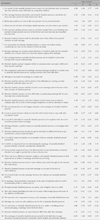Abstract
Purpose
The purpose of this study was to identify the attitude of persons with an mental disability to marriage.
Methods
The Q-methodology which provides a method of analyzing the individual's subjectivity was used. The 30 participants classified 36 selected Q-statements on a 9 point scale to make a normal distribution. The collected data was analyzed by a PC Quanl Program.
Results
Four types of attitude of persons with an mental disability to marriage were identified. Type I: Actively supportive-resistant against social bias, Type II: Passively supportive-reliant on others, Type III: Intensively desiring-less sense of reality, Type IV: Controlling desire-more sense of reality.
Figures and Tables
References
1. Bang SY. Attitudes toward the mentally ill among mental health professionals in Korea. Seoul: Seoul National University;2005. Unpublished master s thesis.
3. Jo EY. A study on the stigmatization process toward the people with mental illness. Seoul: Yonsei University;2000. Unpublished doctoral dissertation.
4. Jo HH. A study on psychiatric patient s marital satisfaction: Seoul and Kyoung-gi area. Seoul: Ewha Womans University;2003. Unpublished master s thesis.
5. Jo HJ. Influence of disability on marital status in Korea and the United States. J Fam Relat. 2007; 12(1):39–64.
6. Jung WC, Park YJ, Sim KS. The analysis on the causal model of schizophrenic patients' social skills, family support, self-esteem, and perceived stigma. Ment Health Soc Work. 2007; 26:25–49.
7. Kiecolt-Glaser JK, Newton TL. Marriage and health: His and hers. Psychol Bull. 2001; 127:472–503.

8. Kim HK. Q methodology: Philosophy of science, theory, analysis, and application. Seoul: Communication Books;2008.
9. Kim HK. Q methodology and theory: Q sampling: Its nature, kind, and procedure. J Korean Soc Sci Study Subj. 2007; 14:19–39.
11. Kim HS, Woo JY. Ego-states and quality of life among persons with mental disorders. J Korean Acad Psychiatr Ment Health Nurs. 2004; 13:14–22.
12. Kim MK, Song JA. Evaluation of a premarital counseling program for marital adjustment. J Korean Home Econ Assoc. 2006; 44(9):77–87.
13. Kwak NJ. A study on the sexual attitude, life and knowledge of the mentally ill: Mentally ill people in 15 different rehabilitation institutions. Seoul: Ewha Womans University;2001. Unpublished master s thesis.
14. Kim SH. Marriage of persons with disabilities: Current status and policy tasks. Health Welf Forum. 2006; 114:19–28.
15. Kim YY, Park HS. The difference in rehabilitation outcomes by the perceived peer support for mentally disabled persons. J Korean Acad Psychiatr Ment Health Nurs. 2005; 14:353–361.
16. Lee SS. A study on impact of the change in values on marriage and fertility behaviors. Health Soc Welf Rev. 2006; 26:95–140.
17. Moon SY. A research on psychiatric patients' marriage lives. Seoul: Ewha Womans University;2002. Unpublished master's thesis.
18. National Rehabilitation Center. Disabled welfare specialists educational materials. 2005. Retrieved September 5, 2005. from http://www.nrc.go.kr.
19. National Rehabilitation Center. Rehabilitation specialists educational materials. 2008. Retrieved March 31, 2008. from http://www.nrc.go.kr.
20. Park MJ. Changes in the meaning of marriage in Korea: The 1960s through the early 2000s. Fam Cult. 2004; 16(1):109–135.
21. Srinivasan TN, Thara R. Outcome of marriage in schizophrenia. Soc Psychiatry Psychiatr Epidemiol. 1997; 32:416–420.

23. Yang OK. Social stigma on people with mental disorder. Korean J Soc Welf. 1998; 35:231–261.
24. Yu MY. A qualitative study on the process of marriage maintenance among mentally disabled persons. Korean J Soc Welf. 2005; 10:437–443.




 PDF
PDF ePub
ePub Citation
Citation Print
Print







 XML Download
XML Download